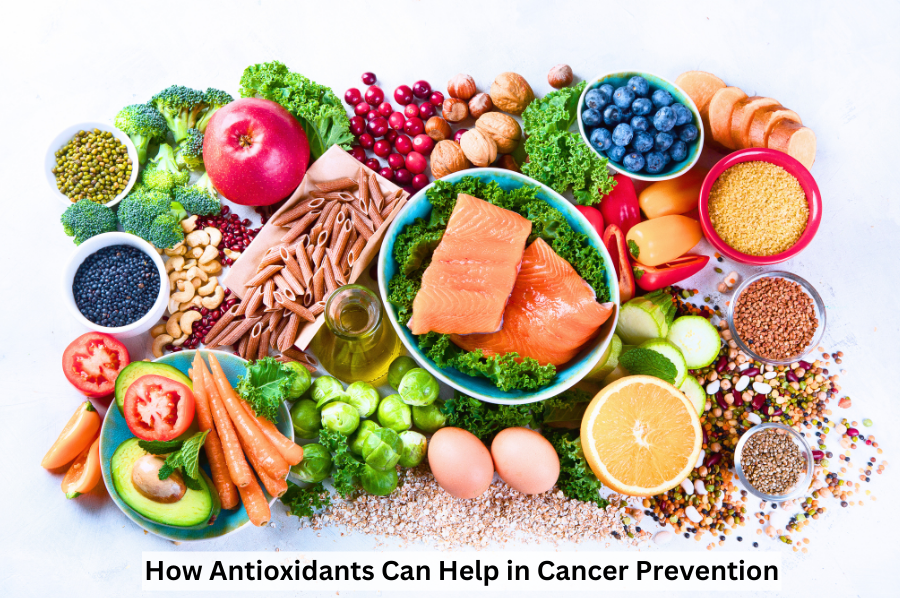BLOG
How Antioxidants Can Help in Cancer Prevention

Cancer remains one of the leading causes of death worldwide, with millions of new cases diagnosed each year. While genetics, environment, and lifestyle choices all play roles in cancer development, one area gaining significant attention in recent years is the role of antioxidants in cancer prevention. Antioxidants are naturally occurring compounds that help neutralize harmful free radicals in the body, potentially reducing the risk of cancer. In this blog, we'll explore how antioxidants can help prevent cancer, the types of antioxidants, and ways to incorporate them into your diet.
Understanding Antioxidants
Antioxidants are molecules that prevent the oxidation of other molecules. Oxidation is a chemical reaction that can produce free radicals, which are unstable atoms that can damage cells, leading to inflammation, aging, and diseases like cancer. Antioxidants neutralize free radicals by donating an electron, thereby preventing cell damage.
The Role of Free Radicals in Cancer
Free radicals are produced naturally in the body during metabolic processes. However, external factors such as pollution, radiation, cigarette smoke, and herbicides can increase free radical production. When free radicals overwhelm the body's ability to regulate them, oxidative stress occurs. This stress can damage DNA, proteins, and cell membranes, potentially leading to cancerous mutations.
Types of Antioxidants
Antioxidants are abundant in many foods and can be classified into several categories:
1. Vitamins
- Vitamin C: Found in citrus fruits, strawberries, bell peppers, and broccoli.
- Vitamin E: Present in nuts, seeds, spinach, and vegetable oils.
2. Minerals
- Selenium: Found in Brazil nuts, seafood, and whole grains.
- Zinc: Present in meat, shellfish, legumes, and seeds.
3. Phytochemicals
- Flavonoids: Found in berries, tea, chocolate, and red wine.
- Carotenoids: Present in carrots, sweet potatoes, and leafy greens.
- Polyphenols: Found in fruits, vegetables, tea, coffee, and wine.
How Antioxidants Help Prevent Cancer
1. Protecting DNA
One of the primary ways antioxidants help prevent cancer is by protecting DNA from damage. DNA damage can lead to mutations that may cause cells to grow uncontrollably, a hallmark of cancer. By neutralizing free radicals, antioxidants reduce the likelihood of DNA mutations.
2. Reducing Inflammation
Chronic inflammation is a known risk factor for many types of cancer. Antioxidants have anti-inflammatory properties that can help reduce chronic inflammation, thereby lowering cancer risk.
3. Boosting Immune Function
A strong immune system is crucial for identifying and destroying abnormal cells that could develop into cancer. Some antioxidants, like vitamin C and selenium, boost immune function, enhancing the body's natural defenses against cancer cells.
4. Inhibiting Cancer Cell Growth
Certain antioxidants can inhibit the growth of cancer cells directly. For instance, polyphenols in green tea have been shown to suppress tumor growth and induce cancer cell death in laboratory studies.
Incorporating Antioxidants into Your Diet
Incorporating a variety of antioxidant-rich foods into your diet is a practical approach to cancer prevention. Here are some tips:
1. Eat a Rainbow of Fruits and Vegetables
Different colors in fruits and vegetables often indicate different types of antioxidants. Aim to include a variety of colors in your diet to maximize your antioxidant intake. Examples include blueberries, strawberries, kale, spinach, carrots, and tomatoes.
2. Choose Whole Grains
Whole grains like brown rice, quinoa, and oats are rich in antioxidants compared to their refined counterparts. Incorporate these grains into your meals for added health benefits.
3. Drink Green Tea
Green tea is a rich source of catechins, a type of polyphenol with potent antioxidant properties. Replace sugary drinks with green tea to boost your antioxidant intake.
4. Snack on Nuts and Seeds
Nuts and seeds, such as almonds, walnuts, and sunflower seeds, are excellent sources of vitamin E and other antioxidants. They make a healthy snack option and can be added to salads and dishes for extra nutrition.
5. Include Herbs and Spices
Herbs and spices like turmeric, cinnamon, and oregano are packed with antioxidants. Use them to season your food to not only enhance flavor but also boost your antioxidant intake.
Conclusion
While no single food or supplement can guarantee cancer prevention, a diet rich in antioxidants can play a significant role in reducing your risk. Antioxidants protect cells from damage, reduce inflammation, boost immune function, and may directly inhibit cancer cell growth. By incorporating a variety of antioxidant-rich foods into your diet, you can support your body's natural defenses and promote overall health. Remember, a balanced diet combined with a healthy lifestyle is the best strategy for cancer prevention.More

